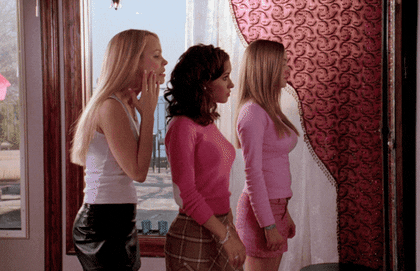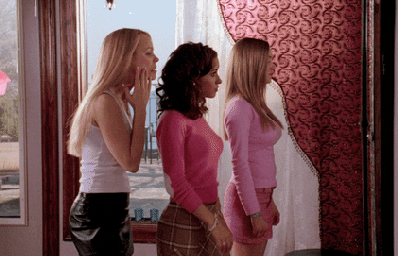Character tropes function as assigned infrastructure for a given character’s attributes, ability, and predictability – specifically regarding how they exist in the narrative they belong to. Sometimes referred to as the “Ditz ” or “Brainless Beauty”, the bimbo is usually conventionally attractive according to eurocentric beauty standards, hyperfeminine, sexually liberated and lack intelligence by all means. Think Karen from Mean Girls, or Cindy from Scream. Or, consider characters that embody an empowered bimbo archetype: Elle Woods from Legally Blonde or Paris Hilton’s public persona in The Simple Life. The term witnessed an increase of popularity around around the late 1970s to the early 2000s, branding women such as Britney Spears, Lindsay Lohan, Monica Lewinsky, Marylin Monroe and many more as bimbos to the public eye.
Historically, the bimbo label is saturated with misogynistic ideals about femininity – but most specifically, it aids the belief that women are not able to be beautiful and intelligent at the same time. It feeds the male gaze by perpetuating stereotypes that objectify, fetishize and infantilize women as vapid sexual objects. So, if you happen to have a large bust, blonde hair, and are wearing pink or revealing clothes, you might be subjected to the bimbo stereotype. More so than this, it feeds purity culture’s ideology that women need to dress a certain (modest) way in order to be worthy of respect. Very sex positive, right?
With the notions of the bimbo trope in mind, there has been a recent reclamation of the term through the Bimbo Movement, largely taking place on TikTok. Self-proclaimed TikTok bimbo Meredith Suzuki framed her take on the movement as such: “Nothing makes misogynists angrier than women choosing to be hot, appearing dumb and yet being incredibly self-aware. Bimbo is no longer a derogatory term now, we’re reclaiming it for ourselves.” In this way, the Bimbo Movement is a femninist movement aiming to dismantle misogyny from the canons of femininity and gender expression while promoting sex positivity, inclusion, and empowernment.
The movement is an active critique of gender norms that challenge the narrow scope of what beauty and femininity can and can’t be. Chrissy Chlapecka, an advocate for socio-political values behind the bimbo movement, states that the new age bimbo is“pro-sex work, pro-Black Lives Matter, pro-LGBTQ+, pro-choice, and will ALWAYS be there for her girls, gays, and theys.”
Followers of the Bimbo Movement across multiple platforms have been ruling this year as “the year of the bimbo” or “the bimbo renaissance”. In the spirit of sex positivity, self-awareness, inclusivity and empowerment, 2022 is the perfect year to fight the patriarchy.


